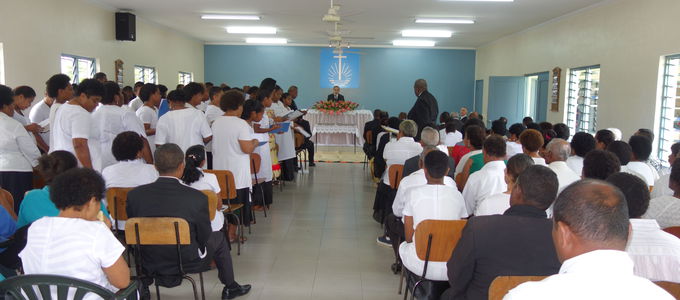Serving God and our neighbour: how, where, when?

Following Jesus? There is more to it than just believing, praying, and going to church. Above all, it means serving God and our neighbour. How, where, and when? The Chief Apostle threw some light on this recently.
“If anyone serves Me, let him follow Me; and where I am, there My servant will be also. If anyone serves Me, him My Father will honour” (John 12: 26). This was the Bible text the Chief Apostle used in a divine service in Suva on Fiji on 19 September 2019.
In order to be able to enter eternal glory, we must believe in Jesus and follow Him, Chief Apostle Jean-Luc Schneider explained. “This is what we promised at our baptism, our sealing, and our confirmation.”
However, following Jesus is more than merely remaining faithful, believing in God, attending services, offering, and praying every day, he said. Following Jesus means following His example.
Important is that Jesus designated Himself as a servant. He came to earth to do the will of His Father. And He came to serve man. “Following Christ means being a servant—a servant of God and a servant of man.”
Being a servant means:
- Jesus tells us what we must do when and where. This is the first definition of “servant”: he must carry out orders.
- His servants must give account. “This is not a threat,” the Chief Apostle said, “just reality. For when He returns and sees that I am not able to serve, then I am of no use to Him in the kingdom of peace.”
- Our worries about our natural concerns should not prevent us from serving Christ: “You cannot serve two masters,” the Chief Apostle said. “You can live your normal day-to-day life, but don’t forget: your priority should be to serve.”
“What does our serving consist of?” The Chief Apostle’s answer was as follows:
- in proclaiming the gospel in word and deed. “Let me give you one example. Sometimes people openly show contempt for certain groups in the population. Then it is our role to say, ‘We do not agree. This is not the will of God.”
- in supporting the mission of the Apostles. “Rather than wait forever to do something good, let’s do it right now. After all, we’re in hurry: Jesus is coming.”
- in refraining from judging or punishing. “Jesus never accused sinners, and He never wanted to punish them. So if the Master does not do that, the servant should not either.”
And where does this service take place?
- The first place is the congregation, the Chief Apostle said. After all, the Lord has asked His people to serve one another.
- We are part of society and fulfil our social responsibilities, the Chief Apostle said, adding that it is our job to show that it is possible to live the gospel under all circumstances.
- We should go to the weak, the sick, strangers and foreigners, those on the fringes of society, and the poor. Jesus also went there, the Chief Apostle said. And where He went, His servants should go too.
And then there is still the case of when:
- in happy moments. Enjoy your life. Jesus did too. But when it was time to serve God, even in the middle of a feast, He did.
- in trials. Jesus served God even when everything went wrong and He was alone.
- until the Lord returns. Jesus should be the only one who decides when we should stop to serve.
In summary Chief Apostle Schneider said: “When He returns, Jesus will say, ‘Well done, good and faithful servant. Enter into the joy of your Lord.’ This is my wish for all of us.”
















